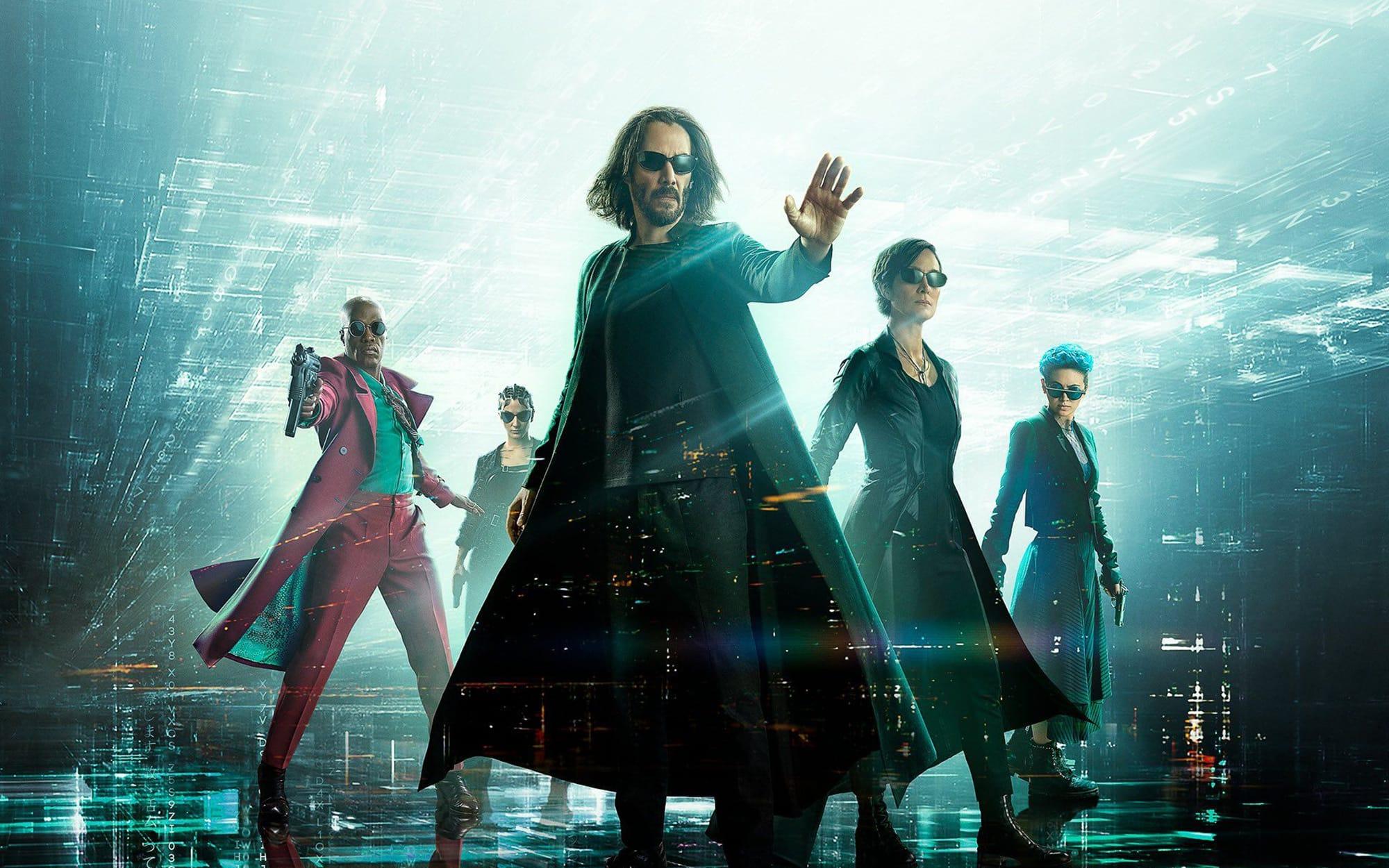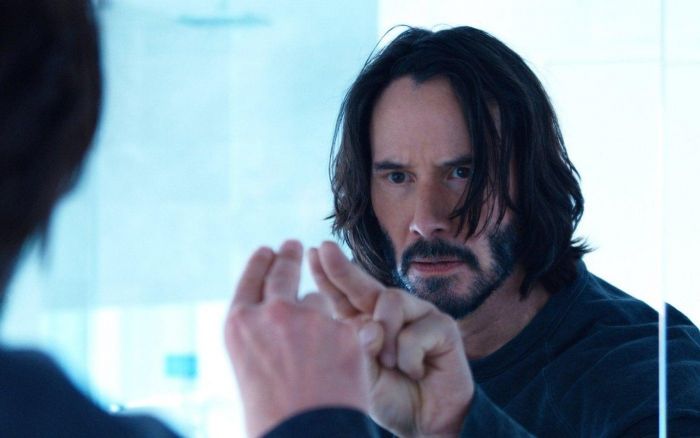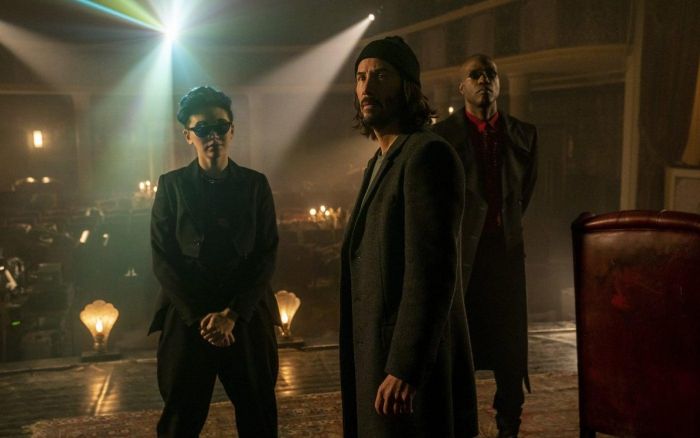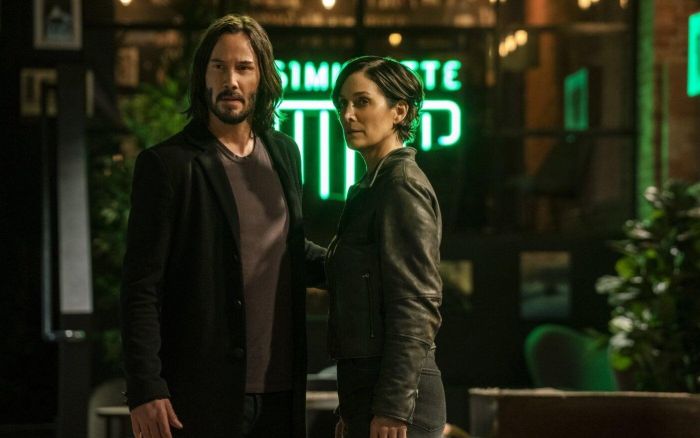The Matrix Resurrections Subverts Its Own Franchise to Explore Trauma, Grief & Romance (Review)

About half-way through The Matrix Resurrections, Neo (Keanu Reeves) asks, in a moment of self-doubt before embarking on a dangerous mission, “What if I can’t be what I once was?” Given the film’s highly meta, self-aware nature, Neo’s question could just as easily apply to Resurrections as a whole, particularly with regards to fan concerns over the return of Neo and Trinity.
To call the original Matrix, which came out all the way back in 1999, “groundbreaking” would be a gross understatement. With its blend of bleeding edge special effects, cyberpunk style, religious imagery, heady philosophizing, and kick-ass martial arts action, The Matrix transformed pop culture, and its impact is still felt even decades later. (Ask yourself: just how many films, TV shows, video games, etc., have ripped off The Matrix since 1999?)
On a more personal note, my first viewing of The Matrix remains one of the greatest movie-going experiences of my life. I saw it on a whim with a friend, both of us assuming it would be a mindless Keanu Reeves action flick. We knew nothing walking into the theater, but as soon as I saw Trinity suspended in mid-air, the camera rotating around her in ultra-cool slow-motion, I was hooked. As we left the theater that night, we were absolutely buzzing over the storyline, heady themes, and mind-blowing visuals.
Rumors of new Matrix titles have been circulating ever since 2003’s The Matrix Revolutions ended the trilogy on a rather underwhelming note. In 2017, for example, Warner Brothers was reportedly working on a Matrix reboot, potentially as a TV series or a prequel film about a young Morpheus. Meanwhile, the Wachowskis were resistant to the notion; at one point, Lilly Wachowski went so far as to call returning to the Matrix “a particularly repelling idea.”
That all changed in 2019, however, when the Wachowskis’ parents died in a short period of time along with one of Lana Wachowski’s close friends. Their deaths left her reeling and unable to process her grief until, as she described it, “[O]ne night, I was crying and I couldn’t sleep, and suddenly, my brain exploded this whole story. I couldn’t have my mom and dad, yet suddenly I had Neo and Trinity, arguably the two most important characters in my life.”
Note: The following contains potential spoilers for The Matrix Resurrections.

So yes, Neo’s back in The Matrix Resurrections. Or rather, Thomas Anderson is back… though not quite. Despite being the world-famous video game designer who created the popular Matrix video games — yes, Resurrections is going to be that kind of film — Anderson feels completely lost and alone. A suicide survivor, he regularly meets with his therapist (Neil Patrick Harris) to work through his trauma. The only bright spots in his life are his random coffeehouse encounters with a married mother of three named Tiffany (Carrie-Anne Moss) who seems strangely familiar.
When his business partner (Jonathan Groff) announces that Warner Brothers wants to reboot the Matrix video games, though, Anderson’s already-tenuous grip on reality grows all the more precarious. Overwhelmed by the pressure of rebooting the Matrix, and increasingly unable to differentiate between reality and what he thinks are dreams, Anderson attempts suicide again — only to be saved by a mysterious, and stylishly dressed, young woman named Bugs (Jessica Henwick) who promises to show Anderson the truth.
By now, you can probably guess where this is heading, even if you’ve never seen any Matrix films (such is its legacy and influence). Thanks to Bugs and a newer, different-looking Morpheus (Yahya Abdul-Mateen II), Anderson is (re)awakened to both his true identity as Neo, the messiah-like One who ended the war between humans and machines, and the state of the real world and the Matrix alike. And sadly, Neo’s sacrifice at the end of Revolutions appears to have been in vain: humanity is still enslaved by the machines and the Matrix is still as pernicious and manipulative as ever, if not more so. But even as Neo struggles to make sense of this new/old reality, one question continues to haunt him: Where’s Trinity?

Resurrections consistently deconstructs, subverts, and questions the Matrix franchise itself, and in particular, its influence on pop culture (for better or worse). During one particularly meta sequence in the film’s first half, Anderson’s co-workers brainstorm ideas for the Matrix reboot while debating what it was “really” about in the first place. (Bullet time! Trans politics! Crypto-fascism! No wonder Anderson’s seeing a therapist. If I was stuck in meetings like that, I’d need some counseling, too.)
Indeed, there are moments where Wachowski seems to actively question the need for any new Matrix content altogether, and this despite the fact that she’s the one actually creating said new Matrix content. In another meta scene, a particularly memorable character from The Matrix Reloaded returns in a shabbier form to decry the world’s current lack of originality. (Is all of this deconstruction and philosophizing heavy-handed? Of course, it is. But would Resurrections really, truly be a Matrix film if it wasn’t heavy-handed?)
Wachowski — who co-wrote the script with David Mitchell and Aleksandar Hemon — clearly has fun taking the piss here, though plenty will be annoyed by her attempt to have her cake and eat it, too, especially when she makes some digs at Warner Brothers and the whole notion of reboots. But some of this deconstruction also seems like a reclamation, a reaction to those (like men’s rights activists and conspiracy theorists) who’ve co-opted Matrix concepts like “red-pilling” to promote their nonsense.

I get why many have responded to Resurrections with antipathy and disappointment, especially after Wachowski starts including throwbacks and footage from previous Matrix films in a manner that can feel like a shameless appeal to nostalgia. (And then has the temerity to make the rejuvenated Morpheus say “Nothing comforts anxiety like little nostalgia.”) What’s more, those watching Resurrections in hopes of seeing more ground-breaking special effects and thrilling action sequences will be disappointed. It certainly has lots of gunplay and Neo throws plenty of kicks and punches, but Resurrections has nothing that comes even close to the first film’s lobby shootout or Reloaded’s highway chase. And though Neo and Morpheus face off in a dojo, their sparring doesn’t compare to the original dojo sequence.
Some of that’s undoubtedly due to the passage of time. Neo might still know kung fu, but Keanu Reeves is nearing 60, if you can believe that, and I’m sure it’s difficult to pull off those same moves now even when assisted by wires and CGI. It also doesn’t help that Yuen Woo-Ping — the legendary Hong Kong filmmaker who choreographed the original trilogy’s eye-popping martial arts action — doesn’t appear in the credits.
But given that Resurrections was created as a response to grief, I’m not sure that over-the-top action is where Wachowski’s heart lies anymore — which is actually kind of refreshing given how gun-fetishy the previous films could be. On a side note, this probably explains why, when Neo’s powers return, they’re largely defensive in nature, e.g., pushing things away, creating forcefields, redirecting missiles and other incoming dangers.
It also explains why Resurrections is most powerful, not when Neo is at his most heroic — he actually doesn’t have any truly major hero moments here — but rather, when it delves into Neo’s trauma and lost-ness, be it his therapy sessions or those moments when his grasp of reality grows more tenuous. Reeves gives a remarkable performance during these scenes, and I wouldn’t be surprised if he drew on his own experience with grief and loss for them. (Reeves’ girlfriend, Jennifer Syme, died in a car accident in 2001, just 15 months after their daughter was stillborn.)

And then there’s the heart of the film, which inspired Wachowski in the first place: Neo and Trinity. No denying here: I bought into their relationship completely. It’s shamelessly romantic and earnest in a way that could be cloying, but I found it very charming and affecting.
While most of Resurrections’ focus is on Neo’s struggle to overcome the Matrix and reunite with Trinity, it doesn’t shy away from Trinity’s conflict and how the Matrix has uniquely imprisoned her. Which, by the way, sets up one of my favorite moments in the film, when a newly freed Trinity punches the main villain in retaliation for shamelessly using children to control her. (A more cynical viewer might use this as proof that Resurrections is anti-family. I saw it more as Trinity’s right and proper anger at something good — i.e., family — being twisted into a tool for control and manipulation.)
Given the wildly divergent and divisive opinions and reviews floating around, I went into The Matrix Resurrections braced for a train wreck and hoping for something more than just a shameless retread. And while I was somewhat disappointed by what Resurrections isn’t (another groundbreaking sci-fi action film), I was pleasantly surprised by what it actually is: an earnestly emotional film that subverts usual action movie heroics in order to explore trauma and grief (albeit with some guns, explosions, and stylish sunglasses for good measure).
The original Matrix still retains its status as a groundbreaking film; nothing about Resurrections takes that away. But the fourth Matrix film adds some interesting new wrinkles to the franchise. (This review’s long enough as it is, otherwise I’d go into greater detail concerning Resurrections’ worldbuilding, be it the burgeoning alliances between humanity and machines, the new human city of Io, or the clever way the film gets around the ethics of gunning down random innocent bystanders.)
In their own way, these wrinkles left me buzzing and giddy for discussion as the end credits rolled. And in the end, I think that’s what I ultimately want from a Matrix film, even more than kung fu and bullet time.
